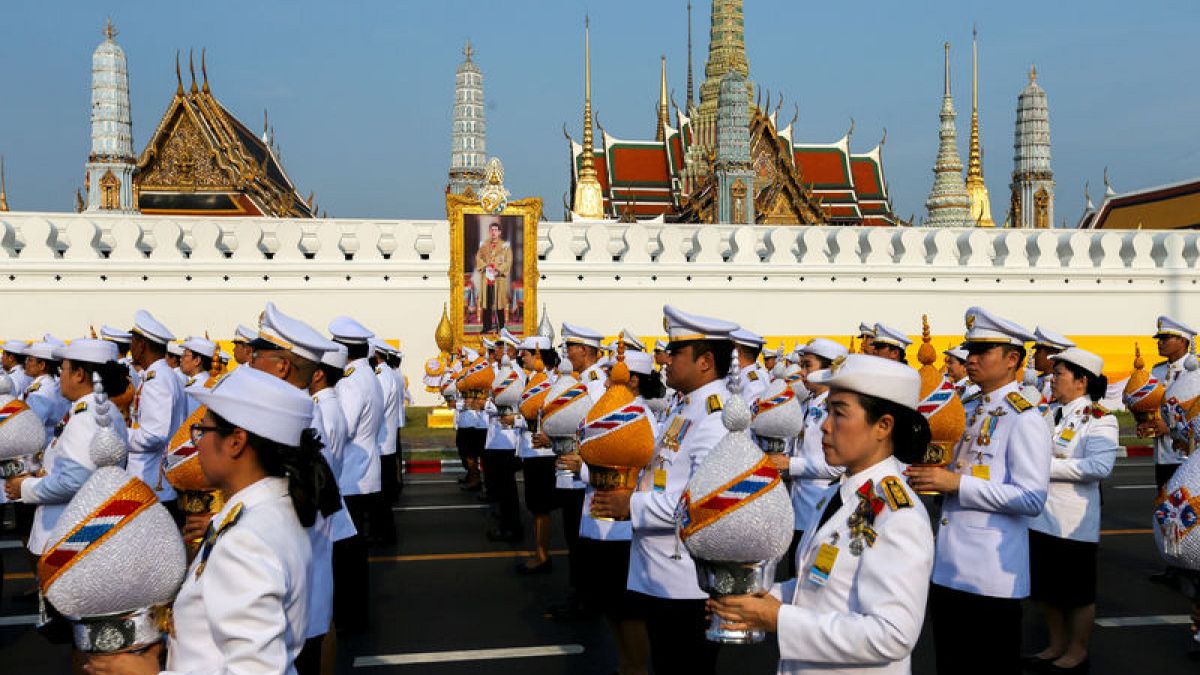By Patpicha Tanakasempipat
BANGKOK (Reuters) – Pondering whether her job is the right fit and whether her romantic relationship is meant to be, Jarunun Sangjun, 27, does what any typical Thai would do: seek out a fortune-teller for advice.
The fortune-teller, who has a table set up on the side of the road near a temple in Bangkok, asks for the date and time of her birth before drawing up horoscope charts.
“The stars are saying this year you’ll change jobs, start a new relationship,” says the fortune-teller known as Ajarn Jamras, who said he has been practicing for 30 years.
The roadside divination is a world away from Thailand’s elaborate preparations for the coronation of King Maha Vajiralongkorn on May 4.
But astrology plays a key role in the coronation ceremonies this week when the monarch, too, will have his horoscope cast.
The main coronation events from May 4 to 6 will be the first the country has seen since Vajiralongkorn’s father, King Bhumibol Adulyadej, was crowned on May 5, 1950. He had reigned for seven decades before he passed away in October 2016.
Thai culture is steeped in astrology and other forms of divination, such as palm reading, tarot cards, and Feng Shui, which all sit comfortably in the country’s brand of Buddhism.
Many Thais, like Jaranun, go to fortune-tellers for everything from guidance on career and love to setting dates for important life events like weddings and business ventures.
On Tuesday, royal astrologers at Bangkok’s Temple of the Emerald Buddha will inscribe the king’s new titles and the horoscope for his reign on a golden plate. Court astrologers traditionally make predictions about the future at every important transition in the nation’s history.
“By showing the horoscope, you’re really showing to those who can read it that this is a legitimate king and this will be a prosperous reign,” said Edoardo Siani, a Thai astrology expert and Thailand anthropologist at Kyoto University in Japan.
Thai astrology derives from Brahmanic practices in the royal court and unlike in the West, it is not strictly about planetary alignments but also concerns numerology and omens.
Thais have been urged to wear yellow from May to July, or from the king’s coronation to his birthday. Yellow carries a significance in Thailand as it is the colour of Monday, the day the king and his father were born on, and also the colour of the Sun, which represents the monarch in the cosmos.
Thais already actively wear certain colours on certain days to align with the planets they represent, believing it will bring good luck. They also look for numbers in obscure places like tree trunks and clouds, believed to be signs from the universe, before buying lottery tickets.
Divination in Thailand is also heavily infused with the Buddhist concept of karma, which dictates that when people make good or bad deeds, the universe will treat them back in kind. This makes fortune-telling in Thai culture more than just about seeing the future, but also having agency to change it, Siani said.
“Everything depends on positive or negative karma, and by engaging in practices like merit-making, you may always hope to change a negative forecast,” he said.
“Seeing the future is just the first part. The services of a specialist are also about providing techniques for dealing with a problematic fortune, or with enhancing good luck.”
Some fortune-tellers such as Ajarn Jamras say that is why they are in the business, as helping people is their calling. “Ajarn” in Thai means “teacher” and is used as a title to convey respect.
After Jarunun asked how to make her current relationship last, changing the outcome he previously forecast, Jamras told her to pray at a shrine for Guan Yu – a Chinese god – in Chinatown, and to refrain from eating meat on Tuesdays, the day of her birth.
“I’m here to show people the way out of misery so they can make their lives better,” Jamras said.
(Reporting by Patpicha Tanakasempipat; Editing by Kay Johnson)

